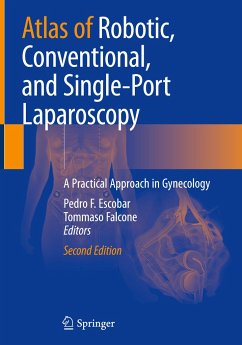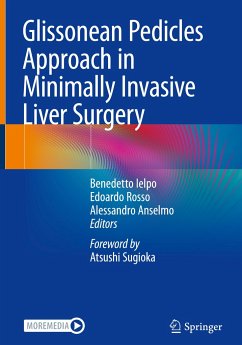
Atlas of Robotic, Conventional, and Single-Port Laparoscopy
A Practical Approach in Gynecology
Herausgegeben: Escobar, Pedro F.; Falcone, Tommaso
Versandkostenfrei!
Versandfertig in 6-10 Tagen
125,99 €
inkl. MwSt.

PAYBACK Punkte
63 °P sammeln!
Minimally invasive surgery has emerged as the standard treatment for many gynecologic diseases and conditions. In the past decade, numerous studies have demonstrated the superiority of laparoscopic approaches over standard open procedures in terms of improved quality of life for patients. Innovations in minimally invasive surgical technology-such as multichannel ports, articulating instruments, and flexible high-definition endoscopes-have made it possible for laparoscopic surgeons to perform increasingly complicated gynecologic surgeries through smaller incisions. As such, since the first edit...
Minimally invasive surgery has emerged as the standard treatment for many gynecologic diseases and conditions. In the past decade, numerous studies have demonstrated the superiority of laparoscopic approaches over standard open procedures in terms of improved quality of life for patients. Innovations in minimally invasive surgical technology-such as multichannel ports, articulating instruments, and flexible high-definition endoscopes-have made it possible for laparoscopic surgeons to perform increasingly complicated gynecologic surgeries through smaller incisions. As such, since the first edition of the atlas published in 2014, technologies and techniques once considered novel have become standard.
This second edition, with five new chapters and content updated throughout to reflect the latest evolutions in the field, serves as a guide in robotic, conventional, and single-port laparoscopic surgery, presenting invaluable, up-to-date information about instrumentation, surgicaltechnique, port systems, and the current research and development in robotics. Chapters address unique challenges associated with each technique, such as lack of haptic feedback or articulation and instrument crowding, and describe the advanced laparoscopic skills required to safely and efficiently perform procedures, such as how to move and control a flexible camera or use the robot.
Specific topics include conventional laparoscopic myomectomy, adnexal surgery, total and supracervical hysterectomy, and excision of endometriosis excision, as well as related techniques in gynecologic oncology, urogynecology and pelvic reconstructive surgery, tubal surgery and ectopic pregnancy, isthmocele repair, and trachelectomy for early cervical cancer. For single-port laparoscopic techniques, chapters are presented on adnexal surgery, hysterectomy, and gynecologic oncology, while the section on robotic surgery offers guidance on instrumentation, platforms, and basic principles; robotic-assisted laparoscopic myomectomy, total hysterectomy for benign disease, endometriosis management, and total hysterectomy for cancer; as well as techniques for robotic adnexal surgery, urogynecology/pelvic reconstructive surgery, tubal surgery, and complication management, concluding with a review of new and emerging technologies.
For students, residents, fellows, operating room personnel, and practicing gynecologic surgeons, the editors share experience amassed while developing novel surgical instrumentation and collaborating on presentations for numerous worldwide events. Internationally renowned experts contribute as well to this practical, illustrated resource on current minimally invasive techniques in gynecologic surgery.
This second edition, with five new chapters and content updated throughout to reflect the latest evolutions in the field, serves as a guide in robotic, conventional, and single-port laparoscopic surgery, presenting invaluable, up-to-date information about instrumentation, surgicaltechnique, port systems, and the current research and development in robotics. Chapters address unique challenges associated with each technique, such as lack of haptic feedback or articulation and instrument crowding, and describe the advanced laparoscopic skills required to safely and efficiently perform procedures, such as how to move and control a flexible camera or use the robot.
Specific topics include conventional laparoscopic myomectomy, adnexal surgery, total and supracervical hysterectomy, and excision of endometriosis excision, as well as related techniques in gynecologic oncology, urogynecology and pelvic reconstructive surgery, tubal surgery and ectopic pregnancy, isthmocele repair, and trachelectomy for early cervical cancer. For single-port laparoscopic techniques, chapters are presented on adnexal surgery, hysterectomy, and gynecologic oncology, while the section on robotic surgery offers guidance on instrumentation, platforms, and basic principles; robotic-assisted laparoscopic myomectomy, total hysterectomy for benign disease, endometriosis management, and total hysterectomy for cancer; as well as techniques for robotic adnexal surgery, urogynecology/pelvic reconstructive surgery, tubal surgery, and complication management, concluding with a review of new and emerging technologies.
For students, residents, fellows, operating room personnel, and practicing gynecologic surgeons, the editors share experience amassed while developing novel surgical instrumentation and collaborating on presentations for numerous worldwide events. Internationally renowned experts contribute as well to this practical, illustrated resource on current minimally invasive techniques in gynecologic surgery.














